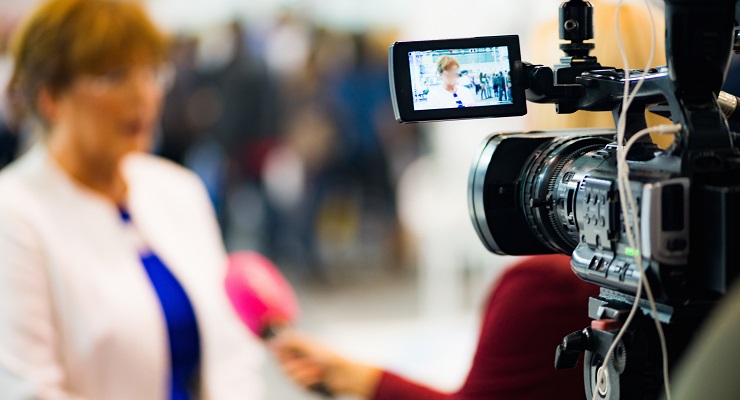
In Both Sides Now, author and ethicist Leslie Cannold presents two sides of an argument. Then it’s over to you: what do you think is true, and what do you think Cannold really believes?
Today: Journalists interviewing journalists. In recent years, journalists have begun interviewing other journalists instead of experts for news stories on radio and television. But is that really journalism, and what’s the cost to Australian democracy?
No: Journalists are generalists, not experts, and their replacement of experts is bad for democracy. Yes: It doesn’t matter who analyses events for audiences as long as they do it well. Journalists are just adapting to the lack of a sustainable funding model for public-interest journalism in Australia, which is the real threat to democracy.
No
You see it everywhere. Whether it’s analysis of the true woman-friendliness of the budget, the biosecurity laws that led to Australians returning from India being threatened with fines, or the mitigation measures needed for Australia to cope with floods of the future, when journalists seek in-depth insights and understanding of complex events in the news cycle these days, they turn to each other — rather than experts such as academics, activists and health or legal professionals — for comment.
This is a radical change from the halcyon days of broadcast media, and it’s dangerous.
When journalists who also report facts become commentators, they undermine the public’s trust in the ability to report facts in an unbiased fashion.
When journalists interview each other rather than experts, it takes the degradation of Australia’s media culture to a whole new level. Here’s why.
In 2011, New York University media academic Jay Rosen came to Australia to explain why America’s — and, not far behind it, Australia’s — political reporting culture was broken. The crux of his argument was the toxic mindset adopted by political reporters called “savvy”.
Savviness is that quality of being shrewd, practical, hyper-informed, perceptive, ironic, “with it”, and unsentimental in all things political. Savvy journalists school the public in what it takes to get elected, to be effective, and to win at a game played by insiders. They say things like, “you might not like it, but it’s smart politics”.
According to Rosen, political reporting that was savvy had displaced news coverage that privileged being “honest or correct on the facts … just, good, fair, decent, strictly lawful, civilised, sincere, thoughtful or humane”.
This is where the loss of experts comes in. Academics and experts are not savvy. Nor do they aspire to be. In fact, the professional values and codes of conduct embraced by academics, activists and professionals in law and medicine are grounded in values of truth, honesty, decency, sincerity, thoughtfulness, humanity, integrity, etc.
When journalists interview journalists, not only do listeners get a double dose of the savvy mindset, this more idealistic way of looking at the world is disappeared altogether.
This harms democracy. A free press is critical for any government by and for the people to survive. We as citizens can’t know what our government is doing without someone acting in our name to find out. That is what the free press is supposed to do: hold power to account.
But when the media isn’t just reporting on the facts but interpreting and commentating on them too, their approach deserves scrutiny. If that approach is about showing their savvy, rather than fighting for ideals like truth, fairness and integrity, the media stops being a check on power and becomes an extension of it instead. If their evaluation of what’s right and wrong is restricted to the savvy bandwidth of what works and cuts through, we the public start evaluating our politics that way, too.
And that way goes the demise of one of the most fragile and idealistic modes of governance there is — democracy.
Yes
Well, that was a bunch of self-serving twaddle. An academic moaning about the decline of academics as experts in the media — what a surprise!
Jay Rosen is a smart man. But he is also an American academic concerned with the problems facing the American media and the cost to democracy there. Australian democracy is nowhere near the crisis point they’ve reached in the United States, which — if you work backwards — suggests the problems facing the Australian media are also not that bad.
The real threat to quality journalism in Australia is not the loss of academics as talking heads but the loss of the business model that funds public-interest journalism.
Insofar as punters want to complain about the declining quality of what they read and see but aren’t willing to reach into their pockets to pay for something better, it’s hard to take them seriously.
Of course the few journalists left in the nation’s newsrooms are taking shortcuts to get the quotes they need — pithy, jargon-free, accessible — on the first phone call or take. With several more deadlines to meet by the end of the day, who has time to mess around?
Which is not to concede that journalists aren’t real experts or as good as them when in-depth knowledge is required. If you want to know what’s happening in Parliament House, members of the Canberra press gallery are absolutely the best people to ask.
On more complicated and contested topics, such as COVID-19 or climate change, the average punter is likely to get far more from a journalist providing a crisp and clear summary of what academics and professionals think than trying to make sense of what academics say themselves.
The loss to Australian academics of the free profile and publicity to which they’ve become accustomed isn’t a problem for anyone but Australian academics. Those truly concerned with the health of Australian democracy have bigger fish to fry.
Which side do you think Cannold sits on? And what do you believe? Send your thoughts to letters@crikey.com.au with Both Sides Now in the subject line. Please include your full name in order to be considered for publication.








You mean Sharri Markson interviewing Peta Credlin and Andrew Bolt interviewing Alan Jones on the position Australia is taking on China is not good journalism? Well I’ll be.
I do like this format, usually I learn something worthwhile about the other side to my own opinion. This one’s definitive though, even Dr Cannold can’t come up with anything for the yes side. Two journalists talking to each other is practically the definition of narcissistic podcast.
Lazy journalism. There are a myriad of experts able to give very balanced, well thought, and evidence-based explanations of events. Journalists should refrain from presenting themselves as such. By all means speak of personal experiences, but that’s it. Report facts, report findings, and interview experts when additional commentary or context or clarity is needed. Don’t be lazy.
Firstly ‘journalists interviewing journalists’ may reflect tightened budgets and resources, trying to fill airtime and classic heuristic shortcuts, and too lazy in seeking out accurate or informed feedback. Further, nowadays ‘journalist’ can be replaced with reporter, presenter, commentator, PR grifter or even influencer, compacted into a meaningless 20 second sound bite (outlined by Neil Postman), or interjections for the appearance of ‘balance’ that precludes analysis (ABC seems compelled to do this more often nowadays).
The roadkill has in fact been objective presentation of social and pure science (research), informed structured analysis and neutral evaluation whe many inmedia do not seem to understand science/research process, data etc.; precluding an informed electorate on key economic and science issues.
This has been exemplified by Alberici at the ABC being pilloried for calling out the ‘trickle down’ myth in economics, and climate science whereby current affairs, panel shows etc. host too many UK/US based science ‘grifter’ sceptics on climate science and/or white nationalists on environment (avoiding any discussion of fossil fuels or climate science).
Hollowed out and resource starved news media have been both ‘gamed’ by corporate &/or political influence and messaging, while news media journalists, especially public broadcasters are often intimidated, by LNP MPs and media organisations. The latter are promoting the US GOP amalgam of radical right libertarian socio-economic ideology, while targeting ageing legacy media audiences into unconsciously accepting a paranoid and angst inducing white Christian nationalist exceptionalist outlook.
On Jay Rosen, saw him interviewed maybe a decade ago by Tony Jones who was informed that Australian journalists etc. are easily led and in fact quite useless, Jones then huffed and puffed ‘No! We ask the really tough questions…’; like his wife doing softball platforming of media operator Steve Bannon…. who’s not a racist……